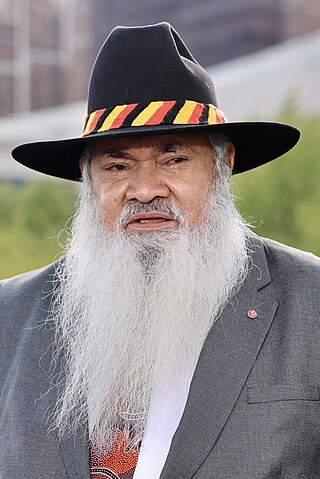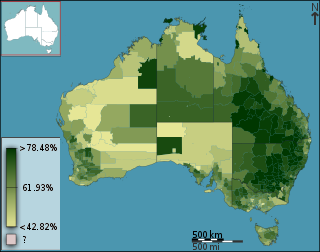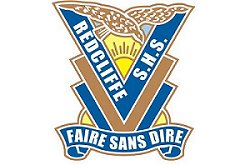
The Uniting Church in Australia (UCA) was founded on 22 June 1977, when most congregations of the Methodist Church of Australasia, about two-thirds of the Presbyterian Church of Australia and almost all the churches of the Congregational Union of Australia united under the Basis of Union. According to the church, it had 243,000 members in 2018. In the 2016 census, 870,183 Australians identified with the church, but that figure fell to 673,260 in the 2021 census. In the 2011 census, that figure was 1,065,796. The UCA is Australia's third-largest Christian denomination, behind the Catholic and the Anglican Churches. There are around 2,000 UCA congregations, and 2001 National Church Life Survey (NCLS) research indicated that average weekly attendance was about 10 per cent of census figures. The UCA is one of Australia's largest non-government providers of community and health services. Its service network consists of over 400 agencies, institutions, and parish missions, with its areas of service including aged care, hospitals, children, youth and family, disability, employment, emergency relief, drug and alcohol abuse, youth homelessness and suicide. Affiliated agencies include UCA's community and health-service provider network, affiliated schools, the Uniting Aboriginal and Islander Christian Congress, Frontier Services and UnitingWorld.

The Sunshine Coast is a peri-urban region in South East Queensland, Australia. In 1967, it was defined as "the area contained in the [former] Shires of Landsborough, Maroochy and Noosa, but excluding Bribie Island". Located 100 km (62 mi) north of the centre of Brisbane in South East Queensland, on the Coral Sea coastline, its urban area spans approximately 60 km (37 mi) of coastline and hinterland from Pelican Waters to Tewantin.

The Canadian Indian residential school system was a network of boarding schools for Indigenous peoples. The network was funded by the Canadian government's Department of Indian Affairs and administered by various Christian churches. The school system was created to isolate Indigenous children from the influence of their own culture and religion in order to assimilate them into the dominant Euro-Canadian culture. Over the course of the system's more than hundred-year existence, around 150,000 children were placed in residential schools nationally. By the 1930s, about 30 percent of Indigenous children were attending residential schools. The number of school-related deaths remains unknown due to incomplete records. Estimates range from 3,200 to over 30,000, mostly from disease.
Murri is a demonym for Aboriginal Australians of modern-day Queensland and north-western New South Wales. For some people and organisations, the use of Indigenous language regional terms is an expression of pride in their heritage. The term includes many ethno-linguistic groups within the area, such as the Kamilaroi (Gamilaraay) and Yuggera (Jagera) peoples.
NAIDOC Week is an Australian observance lasting from the first Sunday in July until the following Sunday. The acronym NAIDOC stands for National Aborigines and Islanders Day Observance Committee. NAIDOC Week has its roots in the 1938 Day of Mourning, becoming a week-long event in 1975.

The Kabi Kabi people, also spelt Gubbi Gubbi, Gabi Gabi, and other variants, are an Aboriginal Australian people native to South Eastern Queensland. During the Australian frontier wars of the 19th century, there were several mass killings of Kabi Kabi people by settlers. They are now classified as one of several Murri language groups in Queensland. A 2024 determination granted non-exclusive native title rights over an 365,345-hectare (902,790-acre) area of land and waters on the Sunshine Coast.

Caboolture is a town and suburb in the City of Moreton Bay, Queensland, Australia. It is located on the northern side of the Caboolture River. In the 2021 census, the suburb of Caboolture had a population of 29,534 people.

Patrick Lionel Djargun Dodson is an Australian indigenous rights activist and former politician. He was a Senator for Western Australia from 2016 to 2024, representing the Australian Labor Party (ALP).

Religion in Australia is diverse. In the 2021 national census, 43.9% of Australians identified with Christianity and 38.9% declared "no religion".

Christianity is the largest religion in Australia, with a total of 43.9% of the nation-wide population identifying with a Christian denomination in the 2021 census. The first presence of Christianity in Australia began with British colonisation in what came to be known as New South Wales in 1788.

Redcliffe State High School is an independent, public, co-educational, secondary school, located in the City of Moreton Bay town of Redcliffe in Queensland, Australia. It is administered by the Department of Education. The school serves students from Year 7 to Year 12.
The Aboriginal Shire of Cherbourg is a local government area in Wide Bay–Burnett, Australia.
Wakka Wakka, or Waka Waka, people are an Aboriginal Australian people of the state of Queensland.
Alistair Arthur Malcolm was the first Aboriginal bishop in the Anglican Church of Australia, licensed as an assistant bishop in the Diocese of North Queensland.
The Dalla, also known as Jinibara, are an indigenous Australian people of southern Queensland whose tribal lands lay close to Brisbane.
Kirstie Parker is a Yuwallarai journalist, policy administrator and Aboriginal Australian activist. From 2013 to 2015 she served as the co-chair of the National Congress of Australia's First Peoples and during her tenure pressed for policies that allowed Aboriginal and Torres Strait Islander Australians to gain the ability for self-determination.
Christopher McLeod is an Australian bishop in the Anglican Church of Australia. He has been an assistant bishop in the Anglican Diocese of Adelaide, as the Bishop for Aboriginal Ministry, since April 2015. McLeod is the second Australian National Aboriginal Bishop, and is only the third Aboriginal person to be a bishop in Australia. He has also been the dean of St Peter's Cathedral, Adelaide, since 31 October 2021.
Common Grace is an Australian non-denominational movement of Christians concerned about issues of justice. The organisation started in 2014. As of May 2020, the network has over 45,000 members. The CEO since June 2022 is Gershon Nimbalker.
Denise Mary Champion is an Aboriginal Australian deacon in the Uniting Church in Australia who serves as an outreach worker. She was the first Aboriginal woman from South Australia to be ordained in any Christian denomination.
Aunty Jean Phillips is an Indigenous Australian elder and has been a senior Aboriginal Christian leader for over 60 years. She was born on the Aboriginal mission of Cherbourg, Queensland and later she served as an Aboriginal missionary herself with the Aborigines Inland Mission (AIM).








